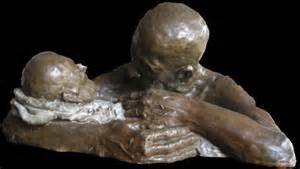. . . the word of God came to John the son of Zechariah in the wilderness. And he went into all the region around the Jordan, proclaiming a baptism of repentance for the forgiveness of sins. Luke 3:2b-3.
Years pass. The fullness of time bubbles and swells under the placid surface of unrecorded history until the moment assigned for it to break out. It has a mouth, and its name is John.
The excited chatter that surrounded his birth is finally verified. His father Zachariah is long deceased but there are probably those alive who remember the moment the old man’s tongue was loosened and broke out in impromptu song . . . something about a horn of salvation and being delivered from our enemies, and the sun rising on a defeated nation. The people who dwell in darkness have seen a great light. Is John that light? He’s already living the life of a holy man in the wilderness, with his paleo wardrobe and six-legged diet. In the wilderness the word of God overpowers him, and next thing you know he comes roaring out of the desert. He takes up residence at the Jordan, a river famous for crossing over (Josh. 3:14-17), where Naaman the Syrian was miraculously cleansed from leprosy (II Kings 5). There John begins a ministry of cleansing and crossing over as he preaches the good news.
His news is bad before it’s good: “Brood of vipers!” are his first recorded words. Just part of his job: to shake Israel out of her complacency and convict her of sin. That was every prophet’s job, from Elijah to Malachi—waking up the sleepers. It’s time to get ready, take heed, beware. Most of all: Repent! The Kingdom of Heaven is approaching! Abraham was your father, not your savior. Judgment is on its way, clutched in Messiah’s hand—a winnowing fork for separating wheat from chaff, an ax laid to the bitter root of the tree.
Chop.
Chop.
The people were in expectation, and all were questioning in their hearts concerning John, whether he might be the Christ. You could hardly blame them—John was every inch the prophet; he even dressed like Elijah (Would he call fire down from heaven? Or raise the dead, or hop aboard a fiery chariot?) The Baptist always denied it when asked, turning their attention to the one whose sandals he was not worthy to untie. Messiah is coming, winnowing fork in hand. Better get ready, because you don’t want to fall with the chaff, come under the ax.
Like all God’s prophets, John was right in substance, but hazy in particulars. Messiah did not hold those tools; he was those tools. And subject to those tools. Judgment was indeed about to fall.
Who knew that he would step in its way?
For the first post in this series, go here.
>Next







